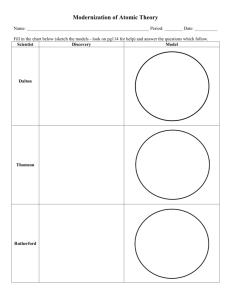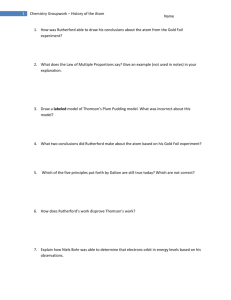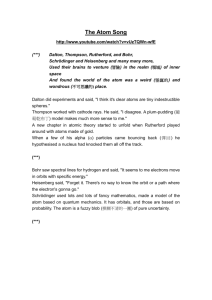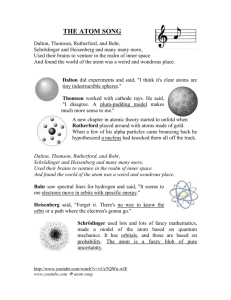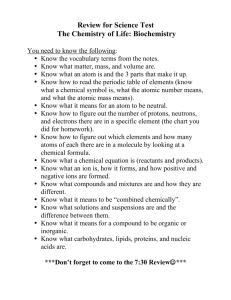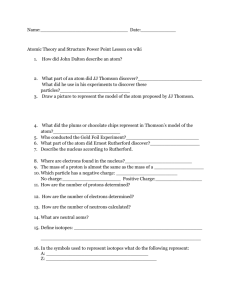Part 1- Developing Ideas of the Atom Instructions: Go to each
advertisement
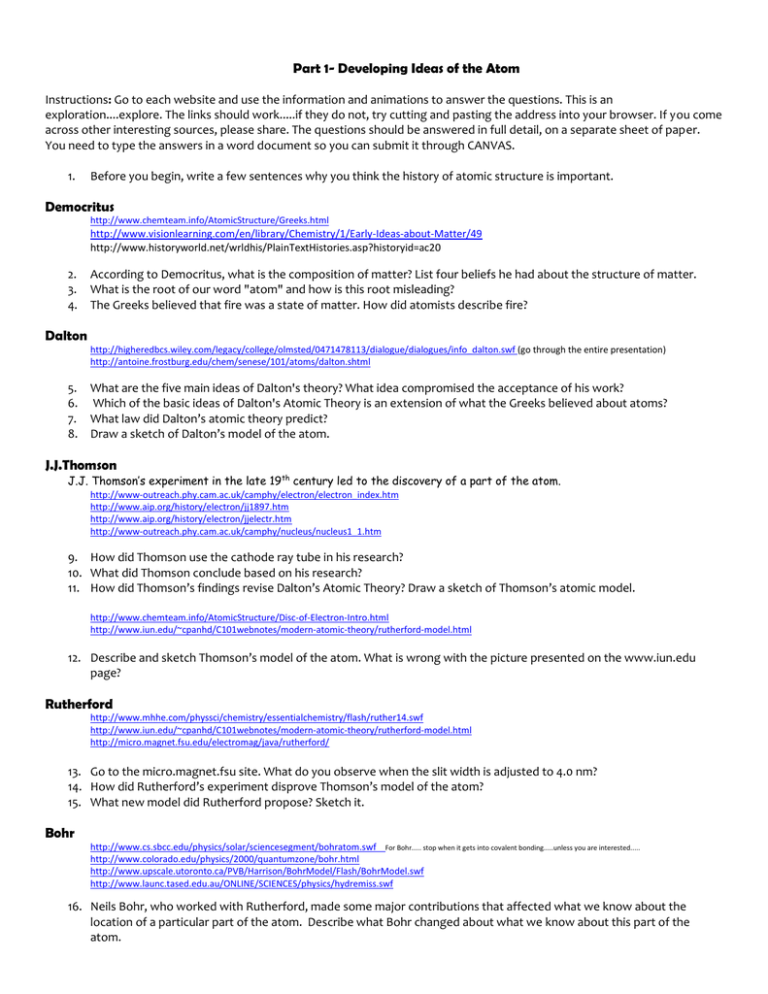
Part 1- Developing Ideas of the Atom Instructions: Go to each website and use the information and animations to answer the questions. This is an exploration....explore. The links should work.....if they do not, try cutting and pasting the address into your browser. If you come across other interesting sources, please share. The questions should be answered in full detail, on a separate sheet of paper. You need to type the answers in a word document so you can submit it through CANVAS. 1. Before you begin, write a few sentences why you think the history of atomic structure is important. Democritus http://www.chemteam.info/AtomicStructure/Greeks.html http://www.visionlearning.com/en/library/Chemistry/1/Early-Ideas-about-Matter/49 http://www.historyworld.net/wrldhis/PlainTextHistories.asp?historyid=ac20 2. 3. 4. According to Democritus, what is the composition of matter? List four beliefs he had about the structure of matter. What is the root of our word "atom" and how is this root misleading? The Greeks believed that fire was a state of matter. How did atomists describe fire? Dalton http://higheredbcs.wiley.com/legacy/college/olmsted/0471478113/dialogue/dialogues/info_dalton.swf (go through the entire presentation) http://antoine.frostburg.edu/chem/senese/101/atoms/dalton.shtml 5. 6. 7. 8. What are the five main ideas of Dalton's theory? What idea compromised the acceptance of his work? Which of the basic ideas of Dalton's Atomic Theory is an extension of what the Greeks believed about atoms? What law did Dalton’s atomic theory predict? Draw a sketch of Dalton’s model of the atom. J.J.Thomson J.J. Thomson’s experiment in the late 19th century led to the discovery of a part of the atom. http://www-outreach.phy.cam.ac.uk/camphy/electron/electron_index.htm http://www.aip.org/history/electron/jj1897.htm http://www.aip.org/history/electron/jjelectr.htm http://www-outreach.phy.cam.ac.uk/camphy/nucleus/nucleus1_1.htm 9. How did Thomson use the cathode ray tube in his research? 10. What did Thomson conclude based on his research? 11. How did Thomson’s findings revise Dalton’s Atomic Theory? Draw a sketch of Thomson’s atomic model. http://www.chemteam.info/AtomicStructure/Disc-of-Electron-Intro.html http://www.iun.edu/~cpanhd/C101webnotes/modern-atomic-theory/rutherford-model.html 12. Describe and sketch Thomson’s model of the atom. What is wrong with the picture presented on the www.iun.edu page? Rutherford http://www.mhhe.com/physsci/chemistry/essentialchemistry/flash/ruther14.swf http://www.iun.edu/~cpanhd/C101webnotes/modern-atomic-theory/rutherford-model.html http://micro.magnet.fsu.edu/electromag/java/rutherford/ 13. Go to the micro.magnet.fsu site. What do you observe when the slit width is adjusted to 4.0 nm? 14. How did Rutherford’s experiment disprove Thomson’s model of the atom? 15. What new model did Rutherford propose? Sketch it. Bohr http://www.cs.sbcc.edu/physics/solar/sciencesegment/bohratom.swf For Bohr..... stop when it gets into covalent bonding.....unless you are interested..... http://www.colorado.edu/physics/2000/quantumzone/bohr.html http://www.upscale.utoronto.ca/PVB/Harrison/BohrModel/Flash/BohrModel.swf http://www.launc.tased.edu.au/ONLINE/SCIENCES/physics/hydremiss.swf 16. Neils Bohr, who worked with Rutherford, made some major contributions that affected what we know about the location of a particular part of the atom. Describe what Bohr changed about what we know about this part of the atom. 17. Draw a sketch of Bohr’s model of the atom. Present Day http://thehistoryoftheatom.weebly.com/modern-quantum-model-schrodinger-and-chadwick.html http://www.ck12.org/book/CK-12-Physical-Science-For-Middle-School/r1/section/5.3/Modern-Atomic-Theory%253A%253Aof%253A%253A-Atoms/ 18. Draw a sketch of the atomic model (charge-cloud) we know today. What is the major difference compared to Bohr’s model of the atom? Parts of the atom http://www.chemthink.com/chemthink.htm (you must register before using the tutorial) To register on the website click the not registered button, enter the code 8998-9120-5227, and fill in the required information. Once you are logged in, click on chapter 4: The structure of the atom. You need read through the atomic structure tutorial. After the tutorial, answer the following questions: 19. What are the three major parts in an atom? 20. Describe each parts charge, location and relative mass Ions & Isotopes 21. Using your login that you created for 19 & 20, complete the Ions and Isotopes tutorial. Also, complete the questions after each tutorial. The scores that you receive on each set of questions are automatically sent to me so do not skip them! Overview/Review http://timelineindex.com/content/view/1228 You will have a quiz on the atomic history of the atom next week. You will need to know which person had which theory and the model of the theory.
